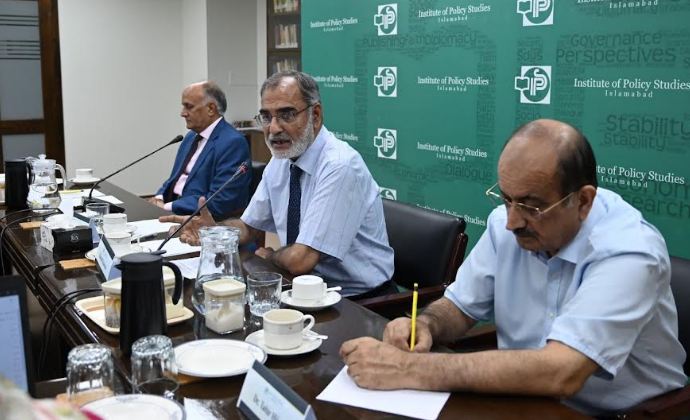ISLAMABAD, SEPT 19 /DNA/ – Pakistan’s increasing vulnerability to climate change-driven extremes demands integrated and urgent responses at all levels, as the increasing frequency of floods, rising temperatures, and deteriorating water quality pose a threat to the country’s food security, water resources, biodiversity, and livelihoods.
While floods have dominated national discussions, rising temperatures, shrinking forest cover, and weak governance capacities pose equally significant risks, all of which undermine resilience. This underscores the importance of ensuring policy implementation, proactive governance, enhancing national water storage capacity, sustainable water management, improving early warning systems, and building local capacity to mitigate the impacts of disasters.
These observations were made by climate and sustainability experts at a roundtable titled “Floods in Pakistan: Building Resilience and Insights for Future Planning,” organized by the Institute of Policy Studies (IPS), Islamabad. The experts included Dr. Pervaiz Amir, climate change expert, Dr. Ghulam Rasul, advisor, China-Pakistan Joint Research Center on Earth Sciences, Dr. Syed Tahir Hijazi, former member Planning Commission, Syed Ikram ul Haq, disaster risk capacity building expert, Yasir Riaz, flood recovery expert, Dr. Imran Hashmi, associate professor NUST, Dr. Mujtaba Hassan, HoD Space Sciences, Institute of Space Technology, and Altaf Sher, president Alkhidmat Foundation, Islamabad. Khalid Rahman, chairman IPS, also joined the session, which was chaired by Mirza Hamid Hassan, former federal secretary water and power, and moderated by Ameena Sohail, an energy sector lawyer.
Dr. Pervaiz Amir highlighted that climate extremes in Pakistan extend beyond floods, with rising temperatures and disappearing winters posing threats to food, water, and biodiversity. He stressed the urgency of increasing the country’s forest cover, which has dropped below 1%, to at least 40%. He also emphasized the importance of building dams to store monsoon rainwater as well as water diversion schemes to desert areas.
Building on his suggestions, Dr. Ghulam Rasul underlined that climate change has intensified heatwaves and floods in recent decades. He recommended vertical rather than horizontal urban expansion and clearing of natural waterways. He also called for incorporating climate projections in town planning.
Emphasizing the need to align human capacity with global best practices, Syed Ikram argued for governance principles that empower communities as the first responders to disasters. He suggested investing in tourism infrastructure as a dual-use asset during disasters and integrating data and AI technology into climate disaster strategies.
This view was also shared by Altaf Sher, who recounted the recent devastating Glacial Lake Outburst Flood (GLOF) events in the north, where giant boulders destroyed communities.
Shifting to the economic dimension, Dr. Tahir Hijazi noted that resilience-focused schemes should not only aim to protect against floods but also harness their benefits. He pointed to fisheries and run-of-river hydropower as untapped opportunities linked to floods.
Highlighting the severe impacts of deteriorating water quality on health, Dr. Imran Hashmi outlined the risks from microplastics and microorganisms, calling for indigenous solutions to manage waste and sewage rather than relying on foreign donors.
Yasir Riaz warned that floods, once considered centennial events, are now striking far more frequently. He argued that the devastation is largely a result of weak local capacity, rather than climate change alone, and urged building resilience at individual, community, and institutional levels.
Dr. Mujtaba Hassan noted that updated scientific research is often not incorporated into disaster policies and early warning systems. He called for integrating atmospheric and climate science into national preparedness strategies.
Hamid Hassan highlighted Pakistan’s dependence on external warnings, citing India’s unannounced water releases, which contravened provisions under the Indus Waters Treaty. He argued for indigenous competence in forecasting and managing disasters and reiterated that floods can offer benefits if actively managed rather than passively endured.
Concluding the discussion, Khalid Rahman emphasized that floods in Pakistan are driven by both climate change and human-made factors, necessitating integrated solutions. He noted that capacity-building must extend from grassroots to national levels, ensuring that short-, medium-, and long-term strategies work in tandem to safeguard people and resources.

















